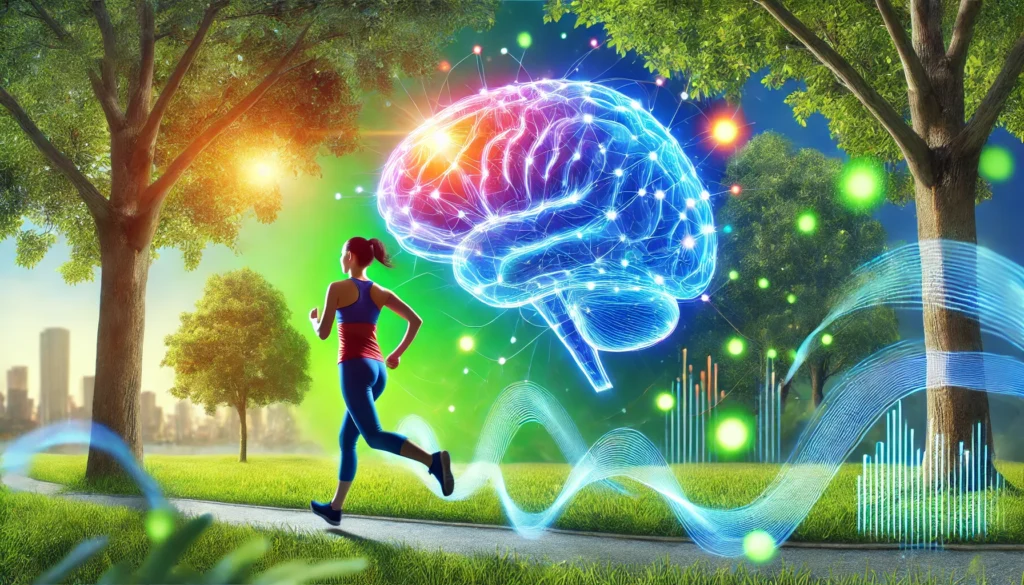Brain health encompasses various facets, including cognitive function, emotional well-being, and the ability to process information efficiently. With age, cognitive decline becomes a concern, but proactive measures can significantly mitigate these effects. Whether you’re aiming to stay mentally sharp in your 70s or seeking ways to sharpen your mind at any age, understanding the basics of brain health is the first step.
You may also like: Top Herbs to Enhance Your Focus
Cognitive Function and Aging
Cognitive function refers to the brain’s ability to think, learn, and remember. As we age, it’s natural for some cognitive abilities to decline. However, research shows that engaging in brain-stimulating activities can slow this process. Activities like learning a new skill or playing strategic games can keep the brain engaged and resilient.
Emotional Well-being
Emotional well-being is closely tied to brain health. Stress and anxiety can negatively impact cognitive function and memory. Practicing mindfulness and stress-reduction techniques such as yoga or meditation can enhance emotional well-being and, in turn, support cognitive health.
Information Processing Efficiency
Efficient information processing is crucial for decision-making and problem-solving. As we age, processing speed may decrease, but exercises that challenge the brain, such as puzzles and memory games, can help maintain this ability. Keeping the brain active is key to preserving its efficiency.
The Science Behind Mental Sharpness
Cognitive decline isn’t an inevitable part of aging. The brain’s neuroplasticity allows it to adapt and change, even in the later years of life. Engaging in activities that challenge the brain promotes the formation of new neural connections, enhancing mental sharpness and overall brain health.
Neuroplasticity and Brain Adaptation
Neuroplasticity is the brain’s ability to reorganize itself by forming new neural connections. This adaptability is what allows us to learn new skills and recover from injuries. To harness neuroplasticity, engage in diverse activities that challenge different parts of the brain, like playing a musical instrument or solving complex problems.
The Role of Neurotransmitters
Neurotransmitters are chemicals that transmit signals across synapses in the brain. They play a crucial role in mood, attention, and learning. Balancing neurotransmitter levels through a healthy diet and regular exercise can improve cognitive function and mental health.
The Impact of Lifestyle on Brain Health
Lifestyle choices significantly affect brain health. Factors such as diet, exercise, and sleep quality all contribute to cognitive performance. A healthy lifestyle can reduce the risk of neurodegenerative diseases and improve overall mental well-being.
Practical Strategies for a Sharp Mind
1. Regular Physical Exercise
Physical activity is not just beneficial for the body; it significantly impacts the brain. Exercise increases blood flow to the brain, promoting the growth of new blood vessels and neurons. Regular aerobic exercises, such as walking, cycling, or swimming, are especially effective in maintaining mental sharpness.
Types of Exercises to Consider
Aerobic exercises are great for overall brain health, but incorporating strength training can also be beneficial. Activities like weightlifting or resistance band exercises help improve coordination and balance, which are essential for brain function.
The Mind-Body Connection
The mind-body connection emphasizes how physical activity can improve mental health. Exercises like yoga and tai chi focus on balance and mindfulness, offering cognitive benefits alongside physical health improvements.
Exercise Consistency and Brain Benefits
Consistency in exercise is key to reaping its brain-boosting benefits. Establishing a routine, whether it’s daily walks or weekly yoga sessions, ensures regular stimulation of brain function and cognitive performance.
2. Balanced Diet
A diet rich in antioxidants, good fats, vitamins, and minerals provides energy and aids in protecting against brain diseases. Foods like blueberries, fatty fish, nuts, and green leafy vegetables are excellent for boosting brain health. Omega-3 fatty acids, in particular, are known to support cognitive function.
Nutrient-Rich Foods for Cognitive Enhancement
Incorporate a variety of nutrient-rich foods into your diet to support brain health. Foods high in antioxidants, such as dark chocolate and berries, help protect the brain from oxidative stress and inflammation.
The Role of Hydration
Staying hydrated is crucial for maintaining cognitive function. Dehydration can lead to confusion and impaired mental performance. Ensure regular water intake throughout the day to keep the brain functioning optimally.
The Impact of Processed Foods
Processed foods, high in sugars and unhealthy fats, can negatively affect brain health. Reducing the intake of these foods can improve mood and cognitive clarity, supporting better brain function.

3. Mental Stimulation
To keep your brain sharp as you age, engage in activities that challenge and stimulate your mind. Puzzles, reading, playing musical instruments, or learning a new language are excellent ways to enhance cognitive function and keep your mind active.
The Importance of Novelty
Introducing novelty into your routine keeps the brain engaged. Trying new activities or varying your daily habits stimulates different parts of the brain, promoting neuroplasticity and mental agility.
Continuous Learning and Growth
Lifelong learning is a powerful tool for brain health. Taking courses or attending workshops can expand knowledge and skills, challenging the brain and enhancing cognitive function.
Creative Expression and Brain Health
Engaging in creative activities, such as painting or writing, boosts brain function by encouraging problem-solving and innovative thinking. Creative expression is a fun way to keep the mind active and healthy.
4. Quality Sleep
Sleep is essential for consolidating memories and clearing out toxins that accumulate in the brain during the day. Adults should aim for 7-9 hours of quality sleep per night to support cognitive health.
Sleep Cycles and Brain Function
Understanding sleep cycles can help optimize rest for brain health. Each cycle plays a role in memory consolidation and emotional regulation, making complete cycles essential for mental well-being.
Sleep Environment Optimization
Creating an optimal sleep environment can enhance sleep quality. Consider factors like room temperature, lighting, and noise levels to ensure a restful night’s sleep, which is crucial for cognitive function.
Overcoming Sleep Disorders
Addressing sleep disorders, such as insomnia or sleep apnea, is vital for brain health. Seeking medical advice and implementing lifestyle changes can improve sleep quality, benefiting overall cognitive performance.
5. Social Interaction
Maintaining social connections is crucial for emotional and mental well-being. Engaging in regular social activities can improve mood and cognitive function, helping to ward off depression and stress, which are known to contribute to memory loss.
Building Supportive Networks
Building and maintaining supportive social networks is important for brain health. Regular interactions with friends and family provide emotional support and cognitive engagement, reducing the risk of mental decline.
Volunteering and Community Engagement
Volunteering and participating in community activities offer opportunities for social interaction and cognitive stimulation. These activities not only benefit mental health but also contribute positively to society.
The Role of Technology in Social Connections
Technology can bridge gaps in social interaction, especially for those with mobility issues. Video calls and online communities offer ways to maintain connections and engage with others, supporting mental well-being.
Advanced Techniques for Brain Health
For those seeking cutting-edge methods to enhance brain function, consider exploring biohacking and nootropics.
Biohacking
Biohacking involves making small, incremental changes to diet and lifestyle to improve health and well-being. Techniques such as meditation, intermittent fasting, and cold exposure can have profound effects on brain function and mental clarity.
Meditation and Mindfulness Practices
Meditation and mindfulness practices can reduce stress and enhance cognitive function. Regular practice can improve attention, memory, and emotional regulation, contributing to overall brain health.
Intermittent Fasting and Brain Benefits
Intermittent fasting has gained attention for its potential brain health benefits. By altering eating patterns, it may improve brain function and protect against neurodegenerative diseases.

Cold Exposure and Mental Clarity
Cold exposure, through practices like cold showers or ice baths, is believed to enhance mental clarity and focus. This biohacking technique can stimulate the release of neurotransmitters that boost mood and cognition.
Nootropics
Nootropics, also known as smart drugs, are substances that can enhance cognitive function, particularly executive functions, memory, creativity, or motivation. While some nootropics are available over-the-counter, others require a prescription. It’s essential to consult with a healthcare professional before starting any new supplement regimen.
Types of Nootropics
There are various types of nootropics, including natural supplements like ginkgo biloba and synthetic compounds. Understanding their effects and potential benefits can help in choosing the right nootropic for cognitive enhancement.
Safety and Efficacy
Before using nootropics, it’s crucial to consider their safety and efficacy. Consulting with healthcare professionals ensures that chosen supplements are safe and suitable for individual needs, minimizing risks and maximizing benefits.
Personalized Nootropic Stacks
Creating personalized nootropic stacks involves combining different nootropics to achieve specific cognitive goals. This approach allows for tailored supplementation, addressing individual cognitive needs and preferences.
The Future of Brain Health
As science and technology advance, new frontiers in brain health continue to emerge. Innovations such as brain-computer interfaces and advanced neuroimaging hold promise for deeper understanding and enhancement of cognitive function.
Emerging Technologies in Brain Health
Emerging technologies like brain-computer interfaces are revolutionizing brain health. These innovations offer new ways to interact with technology, enhancing cognitive abilities and providing insights into brain function.
The Role of Artificial Intelligence
Artificial intelligence (AI) is playing a significant role in brain health research. AI can analyze vast amounts of data, leading to discoveries in cognitive function and the development of personalized brain health strategies.
Personalized Medicine and Brain Health
Personalized medicine, tailored to individual genetic profiles, is becoming more prevalent in brain health. This approach allows for customized interventions, improving outcomes and offering targeted treatments for cognitive enhancement.
Implications for Different Audiences
- Health and Wellness Coaches: By integrating these strategies into your practice, you can offer clients comprehensive advice grounded in science.
- Science Journalists: Use the historical context and current trends to create engaging narratives that resonate with a broad audience.
- Biohackers: Stay informed about the latest breakthroughs to optimize your brain health effectively.

Conclusion
Boosting brain health is a multifaceted endeavor that requires a balanced approach combining lifestyle changes, mental stimulation, and, for those inclined, advanced techniques like biohacking and nootropics. By taking proactive steps, you can maintain or even enhance your cognitive abilities, ensuring a sharp and agile mind well into your later years.
Remember, the journey to a healthier brain is ongoing, and every small step counts. Whether you’re a health coach guiding clients or a biohacker fine-tuning your regimen, embracing these strategies can lead to significant improvements in mental sharpness and overall quality of life.
Further Reading:
Tips to Protect Long-Term Brain Health
6 Tips to Promote Brain Health
Know Brainers: Brain-Healthy Tips
Important Note: The information contained in this article is for general informational purposes only, and should not be construed as health or medical advice, nor is it intended to diagnose, prevent, treat, or cure any disease or health condition. Before embarking on any diet, fitness regimen, or program of nutritional supplementation, it is advisable to consult your healthcare professional in order to determine its safety and probable efficacy in terms of your individual state of health.
Regarding Nutritional Supplements Or Other Non-Prescription Health Products: If any nutritional supplements or other non-prescription health products are mentioned in the foregoing article, any claims or statements made about them have not been evaluated by the U.S. Food and Drug Administration, and such nutritional supplements or other health products are not intended to diagnose, treat, cure, or prevent any disease.


